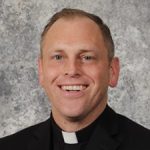 Brother Knights,
Brother Knights,
One advancement I’ve seen in recent years is the ease by which one can come to understand your genealogy and ethnicity. The internet age has allowed us to find out the names of and, perhaps, even a little bit about our ancestors with a lot more ease through sites like genealogy.com. There are now tests where we can find out the different ethnicities and parts of the world from which we came.
This is a human, natural thing to want to know. We want to know our origin. Genealogy and the study of history as a whole allows us to remember the past. Remembering the past helps us gain a better understanding about the present, where we stand right now.
We can look back at history and see the things that went well, the blessings that have been given us, but also the things that did not go well. We can look at the sins and evils of the people of the past so as not to repeat them. A culture that does not look back and reflect is destined to fail because it will lose sight of its identity.
One of the ways that we do this is by celebrating the past. For instance, we honor veterans on Veterans Day, so that we don’t forget the service of the men and women in our armed forces. We celebrate events like the 4th of July and other national holidays to remember the foundation of the country and recognize those who have helped shape it into what it is today. Holidays serve as a kind of memorial to the past.
Our ancestors in the faith, the ancient Israelites remembered the past through genealogies, as evidenced in the Book of Genesis. Moreover, the Gospels of Matthew and Luke both contain genealogies giving witness to Christ as a descendent of King David.
The Israelites also remembered in a ritual, liturgical way. Yes, they would read and recall verbally what had happened in the past, but they also held various feasts, celebrations, penances, sacrifices, and prayers as part of their remembrance of the past.
Remembrance for our ancient ancestors in the faith meant something. It was like going back to the past; it was a rejection of evil and an acceptance of the covenant. But the point that the author of Hebrews is making is that these sacrifices were begging to be fulfilled, and they have been fulfilled in the person of Jesus.
Tapping into that natural desire to know our past is soothed a little bit in our turning to genealogy, history and other ways, but it reaches its perfection when we come to realize that God calls us into his own family. He comes to show us that we are all called to be one with him. And we celebrate that, really in every sacrament, but very clearly in the Mass.
At Mass we proclaim the Word of God, both the Old and the New Testament, we recall the past, but, mysteriously, we also enter into it. We get to know the story, the history through the spoken word. We, through signs and symbols in one Mass, enter into the reality of God’s saving action; we are celebrating the fulfillment of what our ancestors in the faith we’re doing thousands of years ago.
The Mass is the greatest act of remembrance, and so in it we find our true identity.
Sincerely in Christ,
Father Nicholas Kipper
Pastor
St. Teresa Parish


